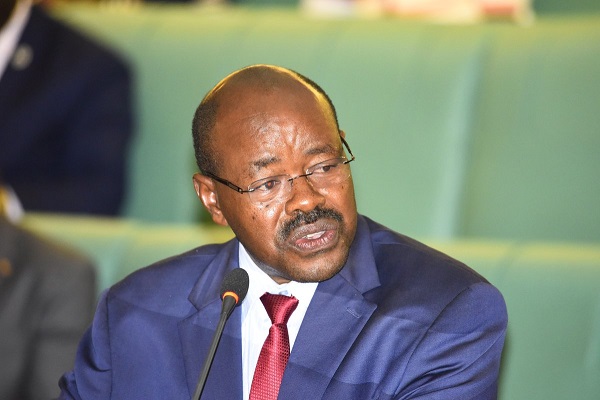Government of Uganda on Thursday launched the fiscal policy to regulate public debt for five financial years (2021/2022-2025/2025).
The State minister for Planning, Mr Amos Lugoloobi while officiating the launch said the fiscal policy among others seeks to ensure that total public debt in nominal terms is reduced to below 50 per cent of the National Gross Domestic Product (GDP) by Financial Year 2025/2026.
“Covid-19 constrained tax revenues leading to an increase in nominal public debt from 35 percent of GDP in Financial Year 2018/2019 to an estimated 49.9 per cent by the end of Financial Year 2020/2021. This ratio is projected to slightly go above the 50 percent policy up to 53 percent in Financial Year 2022/2023,” Mr Lugoloobi said.
He added: “Through implementation of this fiscal policy, the public debt shall be gradually reduced to below 50 percent by the end of FY2025/2026.”
Other objectives of the policy include ensuring that the overall fiscal balance including grants does not exceed three percent of non-oil GDP by Financial Year 2025/2026 as well as ensuring the equitable provision of petroleum revenues among different sectors.
Mr Lugoloobi said the government will be in a position to achieve its policy objectives by enhancing revenue by closing loopholes in the collection as well as timely implementation of public projects that will generate growth and create jobs.
“The policy objectives are practical because we have been doing investments and we are sure that by 2025 the national oil will be out of the ground and government will earn approximately Shs10 trillion annually from oil alone. This will be a bigger boost to our economy,” he said.
Speaking at the launch ceremony of the Charter for Fiscal Responsibility, the director of economics and national content monitoring at the Petroleum Authority of Uganda, Ms Peninah Ahebwa, cautioned the government to ensure prudent fiscal management plans if the fiscal policy is to materialise.
“The fiscal policy states that a maximum of oil revenue worth 0.8 per cent of the previous year’s estimated non-oil GDP outturn shall be transferred to the Consolidated Fund for budget operations and the balance transferred to the Petroleum Revenue Investment Reserve,” Ms Ahebwa said.
In September, the Committee on the National Economy revealed that Uganda’s public debt stock increased by 22 per cent from Shs50.9 trillion in the 2019/2020 fiscal year to Shs69.5 trillion by end of the 2020/2021 fiscal year. This included Shs48.1 trillion, external debt and domestic debt of Shs30.7 trillion.
If you would like your article/opinion to be published on Uganda’s most authoritative news platform, send your submission on: [email protected]. You can also follow DailyExpress on WhatsApp and on Twitter (X) for realtime updates.



